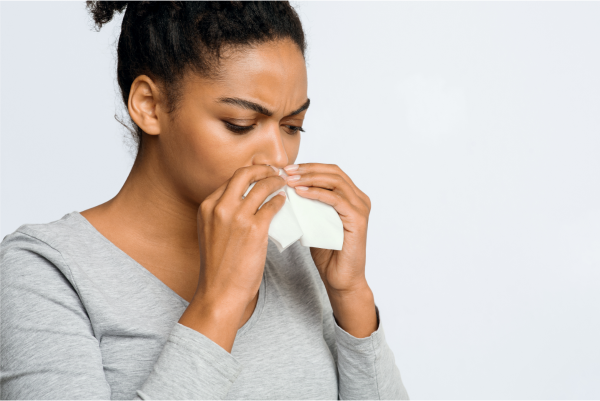Thousands of people in the Southern Los Angeles area suffer from sinus infections and allergies. While over-the-counter medicines, prescription medication, and environmental factors are recommended by a sinus doctor in Encino to aid in managing these conditions, many overlook the role that diet plays.
The foods you eat influence the immune system, inflammation levels, and overall susceptibility to sinus issues and allergic reactions. This article explores the connection between diet and sinus infections and allergies, providing insights into how dietary choices can impact these conditions and offering practical advice for managing them through nutrition.
Understanding Sinus Infections and Allergies
Before delving into the impact of diet, it is essential to understand the basics of sinus infections and allergies.
Sinus Infections: Sinus infections, or sinusitis, occur when the tissue lining the sinuses becomes inflamed. This can lead to blockage, mucus buildup, and infection. Sinusitis can be acute or chronic, with symptoms including nasal congestion, facial pain, headache, and a reduced sense of smell.
Allergies: Allergies occur when the immune system reacts to a foreign substance, such as pollen, dust, or pet dander. These substances, known as allergens, can cause symptoms like sneezing, itching, runny nose, and swelling. Allergic reactions can also trigger sinusitis, exacerbating symptoms.
Both conditions cause inflammation and an abnormal immune response, which various factors, including diet, can influence. Timely treatment by a sinus doctor in Encino is key for quick symptom relief, breathing comfort, and optimal respiratory health.
The Role of Diet in Immune Function and Inflammation
The immune system plays a crucial role in defending against infections and managing inflammation. Certain foods can strengthen the immune system and reduce inflammation, while others can weaken immunity and increase inflammatory responses. Below are some ways diet can affect sinus infections and allergies:
Anti-Inflammatory Foods
Foods rich in anti-inflammatory properties can help reduce inflammation in the sinuses and alleviate allergy symptoms. These include:
- Fruits and Vegetables: High in antioxidants, vitamins, and minerals, fruits and vegetables can lower inflammation. Berries, leafy greens, and citrus fruits are particularly beneficial.
- Omega-3 Fatty Acids: Found in fatty fish, flaxseeds, and walnuts, omega-3s are known for their anti-inflammatory effects.
- Herbs and Spices: Turmeric, ginger, and garlic have potent anti-inflammatory and immune-boosting properties.
Immune-Boosting Nutrients
Certain nutrients can strengthen the immune system, helping the body avoid infections and allergens more effectively. Key nutrients include:
- Vitamin C: Found in citrus fruits, bell peppers, and strawberries, vitamin C enhances immune function and acts as a natural antihistamine.
- Vitamin D: Sun exposure and foods like fatty fish and fortified dairy products provide vitamin D, essential for immune regulation.
- Zinc: Present in meat, shellfish, and legumes, zinc supports immune cell function and helps the body fight infections.
Probiotics
Beneficial bacteria found in fermented foods like yogurt, kefir, and sauerkraut can improve gut health, which is closely linked to immune function. A healthy gut microbiome can reduce the risk of infections and allergic reactions.
Hydration
Staying well-hydrated keeps the mucus membranes moist and is vital for trapping and expelling allergens and pathogens. Water, herbal teas, and clear broths are excellent choices for hydration.
Foods to Avoid for Sinus and Allergy Sufferers
Some foods are beneficial for those with sinus infections and allergies. Others can exacerbate symptoms. It’s important to be mindful of these dietary triggers:
- Dairy Products: For some people, dairy can thicken mucus, potentially worsening sinus congestion. While not everyone is affected, it’s worth noting if you experience increased symptoms after consuming dairy.
- Sugary Foods: High sugar intake can suppress the immune system and promote inflammation. Limiting sweets, sugary drinks, and processed foods can help manage symptoms.
- Processed Foods: Many processed foods contain artificial additives, preservatives, and unhealthy fats, which can trigger inflammation and weaken the immune system.
- High-Histamine Foods: Foods like aged cheese, alcohol, and certain fermented products can release histamines, which may exacerbate allergy symptoms. Monitoring your intake of these foods can be beneficial if you’re sensitive to histamines.
- Alcohol: Alcohol can dehydrate the body and cause vasodilation, leading to nasal congestion. Reducing alcohol intake can help minimize these effects.
- Common Allergens: For individuals with specific food allergies, consuming allergenic foods (like peanuts, shellfish, or gluten) can trigger systemic inflammation, including in the sinuses.
For specific dietary and health recommendations to prevent sinus infections and allergy attacks, schedule an appointment with a sinus doctor in Encino.
Diet and Chronic Sinusitis
Chronic sinusitis, characterized by prolonged inflammation of the sinuses, can be particularly challenging to manage. Diet plays a crucial role in reducing the severity and frequency of symptoms:
- Low-Inflammation Diet: A diet rich in anti-inflammatory foods can help manage chronic inflammation. Eating plenty of fruits, vegetables, whole grains, lean proteins, and healthy fats can make a significant difference.
- Elimination Diet: Identifying and avoiding foods that trigger inflammation and allergies is key. An elimination diet can help pinpoint specific dietary triggers.
- Allergen-Free Diet: For those with known food allergies, strictly avoiding allergenic foods is crucial to preventing chronic inflammation and sinus issues.
- Hydration: Proper hydration helps thin mucus secretions and prevents sinus blockages.
- Healthy Fats: Incorporating sources of healthy fats, such as avocados, nuts, and olive oil, can support overall health and reduce inflammation.
Practical Dietary Tips for Managing Sinus Infections and Allergies

- Eat a Rainbow: Incorporate a variety of colorful fruits and vegetables into your meals. Each color represents different nutrients and antioxidants that can boost your immune system and reduce inflammation.
- Include Omega-3s: Add sources of omega-3 fatty acids to your diet, such as salmon, chia seeds, and walnuts, to benefit from their anti-inflammatory properties.
- Stay Hydrated: Aim to drink at least eight glasses of water a day. Herbal teas and water-rich fruits and vegetables can increase your hydration levels.
- Choose Whole Foods: Opt for whole, unprocessed foods whenever possible. These are less likely to contain additives and preservatives that can trigger inflammation.
- Limit Sugars and Refined Carbs: Reduce your intake of sugary snacks, sodas, and refined carbohydrates, which can spike blood sugar and promote inflammation.
- Add Probiotics: Incorporate probiotic-rich foods like yogurt, kefir, and kimchi into your diet to support a healthy gut microbiome and improve immune function.
- Avoid High-Histamine Foods: If you’re prone to histamine reactions, try reducing your intake of foods like aged cheeses, cured meats, and alcohol.
- Monitor Dairy Consumption: Dairy products worsen sinus congestion. If you’re prone to this reaction, consider limiting or substituting them with plant-based alternatives.
- Prepare for Allergens: If you have known food allergies, always check labels and be cautious when dining out to avoid accidental exposure.
- Seek Medical Attention: For personalized advice, consider coordinating with a sinus doctor in Encino and a registered dietitian for a customized diet plan that addresses your specific needs and health goals.
Conclusion
Diet plays a crucial role in managing sinus infections and allergies. By focusing on anti-inflammatory and immune-boosting foods while avoiding known dietary triggers, you can boost your body’s natural ability to handle these conditions. Making mindful food choices can reduce the severity and frequency of symptoms, improve overall health, and enhance your quality of life.
If you struggle with chronic sinus issues or allergies, see a sinus doctor in Encino and incorporate dietary adjustments into your comprehensive treatment plan. Contact C/V ENT Surgical Group today for an appointment.

